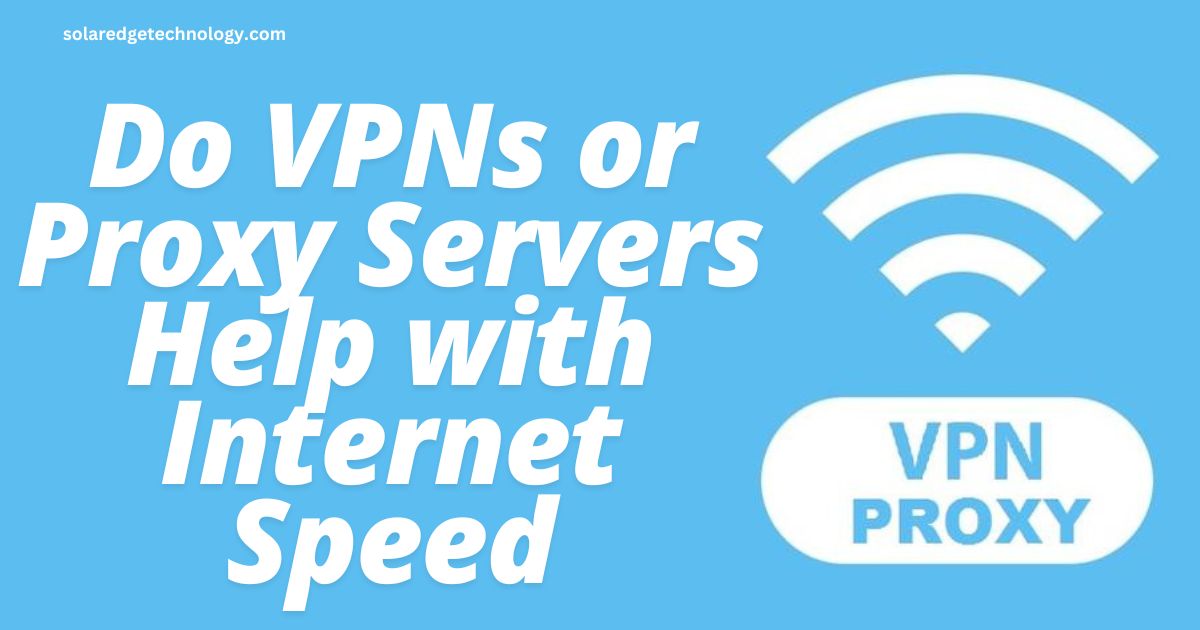Internet speed is crucial in today’s digital world. Whether streaming, gaming, or working online, we all seek a fast and reliable connection. But can tools like VPNs or proxy servers boost internet speed? This article provides a detailed exploration of whether do VPNs or proxy servers help with internet speed and under what circumstances they can improve or hinder your online experience.
Key Takeaways
- VPNs and proxy servers primarily focus on privacy, security, and bypassing geo-restrictions rather than improving speed.
- They may improve speed under specific conditions, such as bypassing ISP throttling or accessing optimized servers.
- The choice between VPNs and proxy servers depends on your needs for security, speed, and anonymity.
What Are VPNs and Proxy Servers?
VPN (Virtual Private Network)
A VPN creates a secure and encrypted tunnel between your device and the internet. This ensures your online activities are private and shielded from external monitoring.
Key Features of VPNs:
- Encryption: Protects your data from prying eyes.
- Anonymity: Hides your IP address.
- Bypassing Geo-Restrictions: Allows access to restricted content.
Proxy Servers
A proxy server acts as an intermediary between your device and the internet. Instead of connecting directly to websites, your requests pass through the proxy server.
Key Features of Proxy Servers:
- IP Masking: Hides your real IP address.
- Content Filtering: Often used by organizations to block specific sites.
- Faster Access to Cached Data: Provides quicker access to frequently visited websites.
Do VPNs or Proxy Servers Help with Internet Speed?
While VPNs and proxy servers aren’t designed to directly enhance internet speed, they can affect it in several ways:
Scenarios Where VPNs Can Improve Speed
- Bypassing ISP Throttling Some Internet Service Providers (ISPs) intentionally slow down specific types of traffic, like streaming or gaming. A VPN can hide your activity from the ISP, preventing throttling and potentially increasing speed.
- Accessing Optimized Servers Premium VPN providers often have servers optimized for speed. Connecting to a server closer to your location or one with lower latency can improve performance.
- Reducing Routing Delays A good VPN can optimize the route your data takes, potentially reducing delays caused by inefficient routing.
Scenarios Where VPNs Can Slow Down Speed
- Encryption Overhead Encrypting and decrypting data requires processing power, which can slightly reduce speed.
- Server Congestion Free or overcrowded VPN servers often lead to slower speeds.
Scenarios Where Proxy Servers Can Improve Speed
- Caching Proxy servers store copies of frequently visited websites. If you request a cached site, the proxy can deliver it faster than fetching it from the internet.
- Load Balancing Some proxy servers distribute traffic efficiently, reducing congestion and improving speed for end-users.
Scenarios Where Proxy Servers Can Slow Down Speed
- Increased Latency Adding an intermediary (the proxy server) can introduce delays in data transmission.
- Lack of Encryption While proxies don’t encrypt data, they may still introduce lag due to inefficient routing.
Advantages of VPNs and Proxy Servers
| Advantages | VPNs | Proxy Servers |
|---|---|---|
| Privacy | Encrypts all data for maximum privacy | Hides IP address but does not encrypt data |
| Security | High security with AES-256 encryption | Limited security features |
| Access Geo-Blocked Content | Excellent for bypassing geo-restrictions | Effective but less reliable for streaming |
| Speed Optimization | Helps bypass ISP throttling and access fast servers | May speed up cached website access |
Comparison Table: VPNs vs. Proxy Servers
| Feature | VPNs | Proxy Servers |
| Encryption | Yes | No |
| Data Privacy | High | Medium |
| Speed Impact | May improve or reduce speed | Generally faster for cached data |
| Compatibility | Works on all apps and browsers | Works only with specific applications or browsers |
| Cost | Free and paid options | Often free or low-cost |
FAQs
1. Do VPNs or proxy servers help with internet speed?
VPNs can help bypass ISP throttling and optimize routing, potentially increasing speed. Proxy servers can improve speed by caching frequently visited websites. However, both tools can also slow down speed under certain conditions.
2. Is a VPN better than a proxy server for speed?
VPNs are generally better for bypassing throttling and optimizing performance. Proxy servers may offer faster access to cached content but lack encryption and robust privacy features.
3. Can a free VPN improve internet speed?
Free VPNs often have limitations like server congestion and data caps, which may hinder speed improvement. Premium VPNs are more reliable for enhancing speed.
4. Are proxy servers safe to use?
Proxy servers offer minimal security compared to VPNs. They are best suited for non-sensitive activities.
Conclusion
The answer to whether do VPNs or proxy server help with internet speed depends on your specific needs and circumstances. While VPNs excel at bypassing ISP throttling and providing secure, optimized connections, proxy servers shine in delivering cached data quickly. However, both tools can sometimes introduce delays due to server congestion or inefficient routing.
For enhanced privacy, security, and speed, a premium VPN is often the best choice. If your primary need is quick access to cached websites or bypassing simple restrictions, a proxy server may suffice. Assess your requirements and choose the tool that best aligns with your internet usage.
